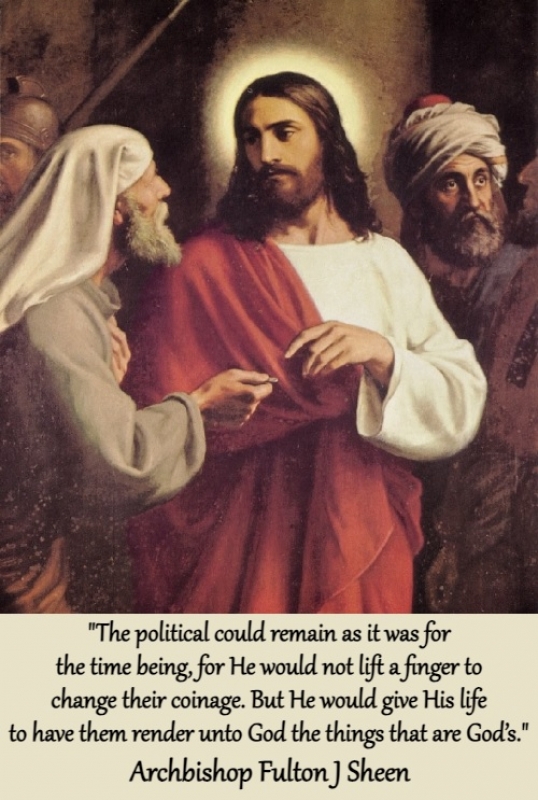29th Sunday in Ordinary Time (Year A) - 22 October
22nd October 2023

29th Sunday in Ordinary Time (Year A) - 22 October
“All the things in this world are gifts of God, created for us, to be the means by which we can come to know Him better, love Him more surely, and serve Him more faithfully.” - St Ignatius of Loyola
A reflection on today's Gospel by the Venerable Archbishop Fulton J Sheen:
"All Israel had been in the hands of the Romans ever since Pompey entered the Holy City defended by Aristobulus and carried him and thousands more off into captivity. The country, then, was a tributary of Rome. When the word ‘freedom’ was used, it was almost always understood in the political sense of overthrowing the slavery of Caesar.
"Our Lord, therefore, constantly had to deal with this problem—either because some hoped He would be a political liberator, or because whenever He spoke of freedom it was misunderstood as liberation from Rome. In three separate incidents He cleared up His position on this subject, leaving no doubts as to what He regarded as the True Freedom:
1. Political freedom from Caesar was not primary.
2. True Freedom was spiritual and meant liberation from sin.
3. To acquire this Freedom for everyone, Jew and Gentile alike, He would submit Himself voluntarily as a ransom for sin.
"Two groups held contrary views concerning Caesar: the Herodians and the Pharisees. The Herodians were not a sect or a religious school, but a political party. Outwardly they were friends of Caesar and of the Roman authority; though they were not Romans, they favoured the House of Herod as the occupant of the Jewish throne; this made them friends of pagan Rome and Caesar, Herod himself being the vassal of Caesar.
"Another party was the Pharisees, who were now at the height of their power. Being Puritans concerning the Law and Jewish traditions, they refused to acknowledge any authority to Rome; they had even attempted, according to Josephus, to put Herod to death. As nationalists, they refused to acknowledge Roman dominion and hoped that one day the Jews under their Messiah-King would rule the world.
"Both of these groups were enemies, not only because the Herodians sided with Caesar and were willing to pay tribute to the conqueror, while the Pharisees despised Caesar and paid tribute under protest, but also because the Herodians were not particularly interested in religion, while the Pharisees professed to be its most exemplary models.
"One day after Our Lord had cured a man on the Sabbath, the Pharisees began plotting with those of Herod’s party to make away with Him. That the Pharisees should have tolerated even such a temporary alliance with the Herodians, shows the virulence of the hatred directed against Our Blessed Lord.
"The Herodians could not have come before Our Blessed Lord without arousing some suspicion of their base motives, nor did the Pharisees, always astute, come to Him in person. They sent some of their young scholars, as though in their guileless simplicity they were merely seeking information. The Pharisees gave Our Blessed Lord the impression that a dispute had arisen between them and the Herodians, as indeed would have been very natural. They desired to settle it by referring it to Him as the great scholar. They began by praising Him, thinking foolishly that He might be won over by a little flattery. Then came the question, and a real trick question it was: ‘Is it right to pay tribute to Caesar, or not?’
"They expected Our Blessed Lord to answer either ‘Herodians’ or ‘Pharisees.’ If He answered, ‘No, it is not lawful to render tribute to Caesar,’ then the Herodians would have delivered Him over to the Roman authorities, who in turn would order His death for conspiring to revolution. If He said, ‘Yes, it is lawful,’ then He would displease the Pharisees, who would go before the people and say that He was not a Messiah, for no Messiah, or deliverer, or Saviour would ever consent that the people should put their necks under the yoke of an invader. If He refused to pay the tax He was a rebel; if He agreed to pay it, He was an enemy of the people. To say ‘No’ would make Him a traitor to Caesar; to say ‘Yes’ would make Him antinational, antipatriotic. In either case it would seem that He was caught in a trap. The fellow travellers would condemn Him for being an enemy of the great leader, Caesar; the semireligious would damn Him for being an enemy of His country. The snare in the question was heightened by the fusion of the religious and the political elements in the ancient history of Israel; but now the two were separated. How could an absolute standard be applied to both God and Caesar?
"Despite the fact that they began with a compliment, Our Blessed Lord could hear the hiss of the serpent. Though they boasted that He was fearless and impartial, He blinded them with the flash of the one indignant word ‘hypocrites.’ He then said to them: ‘Show Me the coinage in which the tribute is paid.’ So they produced a coin and put it into His hand. On one side was stamped the features of the Emperor, Tiberius Caesar, and on the other side of the coin was stamped his title Pontifex Maximus. Our Lord asked them: ‘Whose is this likeness? Whose name is inscribed on it?’ They answered: ‘Caesar’s.’ Then came His answer: ‘Why then, give back to Caesar what is Caesar’s, and to God what is God’s.’
"Our Lord took no sides, because the basic question was not God or Caesar, but God and Caesar. That coin used in their daily marketings showed they were no longer independent from a political point of view. In that lower sphere of life, the debt to the government should be discharged. He fostered no aspirations for independence; He promised no aid in liberation. It was even their duty to acknowledge the present dominion of Caesar, imperante Tiberio. The Greek word in the Gospel for ‘give back’ or ‘render’ implied a moral duty such as St. Paul later on told the Romans (Romans 13:1). But in order to remove the objection that service to the government exempted from service to God, He added: ‘And to God what is God’s.’ Once again He was saying that His Kingdom was not of this world; that submission to Him is not inconsistent with submission to secular powers; that political freedom is not the only freedom. To the Pharisees who hated Caesar came the command: ‘Give unto Caesar’ to the Herodians who had forgotten God in their love of Caesar came the basic principle: ‘Give unto God.’ Had the people rendered to God His due, they would not now be in their present state of having to render too much to Caesar. He had come primarily to restore the rights of God. As He told them before, if they sought first the Kingdom of God and His Justice, all these things such as political freedom would be added unto them.
"That coin bore the image of Caesar, but whose image did the questioners bear? Was it not the image of God Himself? It was this image He was interested in restoring. The political could remain as it was for the time being, for He would not lift a finger to change their coinage. But He would give His life to have them render unto God the things that are God’s."
(Life of Christ)
Prayer to Know and Love God at All Times
Eternal God and Divine Father, grant me the eyes of faith so I may see Your Will in all things. Grant me the serenity to accept the things I cannot change, the courage to change the things I can, and the wisdom to know the difference. In my successes and my failings, in times of joy and in times of sorrow, in times of plenty and in times of deprivation, in times of war and in times of peace, let me never cease to trust in Your Divine Wisdom, for You govern all things with perfect love. Grant me a good and obedient heart so I may only ever seek to know, love, and serve You at all times. Amen. 


Food for thought
St Ignatius of Loyola coined the phrase, “Finding God in all things.” From the most mundane events in our life, to the catastrophic wars and natural disasters that afflict the world, God may be found in all these things. We simply must learn to trust in Him and carry out the words of scripture, “I will bless the Lord at all times; His praise will always be on my lips” (Psalm 34:1). Even when all around you seems dark and the world in turmoil, do all for the greater glory of God. All things you undertake (unless they are evil) are sources of praise and giving glory to God. It is not only prayer that gives glory to God, but your work, acts of charity, even your recreation activities! Sweeping floors, writing reports, changing nappies, listening to others, gardening, everything gives God some glory if being in His grace you do it as your duty and with a cheerful heart.


